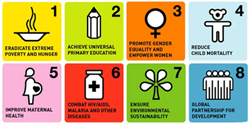Taxation and tax evasion and achieving the MDGs

Commissioner Piebalgs, together with President of the African Development Bank Donald Kaberuka will chair a side level event on the margins of the UN Summit on the Millennium Development Goals (MDGs) (New York, 1.00 – 3.00 p.m. local time). This Commission's event is titled «Domestic Resource Mobilisation – Achieving Development and the MDGs in a Sustainable Way» and focuses on the issues related to taxation and tax evasion in the developing world.
Efficient tax systems are crucial for the Millennium Development Goals. They contribute to financing the provision of public goods and contribute to state building and good governance. The financial and economic crisis has increased the need to raise more tax revenues in developing countries, which have been severely hit by shrinking commodity prices and the contraction of international trade. Developing countries often suffer high tax losses due to the structure of their economy, weak administrations, and inadequate tax policies. In addition the global system of financial transactions and the abundance of non-cooperative jurisdictions have made feasible tax evasion and tax avoidance at low risk. This affects both developing and developed countries.
Several hundred billion dollars…
…that is the commonly quoted estimate of the amount of tax revenue that developing countries lose every year due to tax evasion and avoidance. It is alleged that badly needed income to finance development goals is shifted to non-cooperative jurisdictions, reducing domestic income and making developing countries more dependent on international aid.
The Doha Declaration 2008 lays the cornerstone for action «to increase tax income through modern tax systems, more efficient tax collection, a widening of the tax base and effectively combating tax evasion». Repeatedly the international community has engaged to fight harmful tax practices. At the G20 meeting in Pittsburgh, the world's leaders reiterated their commitment to fight tax evasion, illicit financial flows and harmful practices at international level. The European Commission, in its Communication of April 21 2010 Tax and Development – Cooperating with Developing Countries on Promoting Good Governance in Tax Matters, has proposed concrete actions to support developing countries in mobilising more domestic revenues for development.
Framing the problem: The state of tax systems in developing countries
Developing countries have a much lower tax to GDP ratio than developed ones – in low income countries it generally ranges between 10 - 20% of GDP against 25% - 45% in the High income group. The consequence of this low tax ratio is that low income countries face considerable difficulties in raising enough revenue to provide for basic public services as health, education and infrastructure.
Low tax revenue is due to a variety of factors. The structure of the economy is the first obstacle to tax collection. With a vast informal sector and large parts of the population living from subsistence agriculture the tax base is often narrow in developing countries. Moreover when taxes should be paid they are often difficult to collect for reasons of administrative weakness and complicated tax procedures. Another important issue is tax morale. Widespread corruption and weak governance have an impact on the taxpayers' willingness to comply with tax regulation and contribute to make tax evasion socially acceptable. Paying taxes is part of a (fiscal) social contract that requires citizens to contribute to the budget of the state, and at the same time allows citizens to expect public services in return. A broad tax base, involving many citizens as taxpayers, contributes to enhanced governmental accountability and has a beneficial impact on governance in general.
Capital Flights impacts on poverty eradication
Every year billions of dollars are shifted out of developing countries. This staggering figure is increasing constantly. International tax experts will introduce us to mechanisms of capital flight and tax evasion through case studies from Zambia, Ghana and Latin America. Natural resource taxation accounts for an important share of revenues in many African countries. Yet, poorly negotiated conditions with multinational enterprises, tax incentives, transfer pricing and corruption contribute to reduce tax revenues from these sources. Moreover individuals shifting capital abroad is another important aspect that significantly decreases revenue.
Several domestic factors contribute to facilitate tax evasion in developing countries. Loopholes in tax regulations make it possible for taxpayers to legally avoid taxation. Furthermore, tax authorities often lack capacities to assess the tax due and struggle to determine taxable corporate profits.
The OECD has been very active in drafting model conventions and agreements for transparency and information exchange between tax authorities. Yet, tax evasion and avoidance still continue to exist, even though many non-cooperative jurisdictions started to sign tax information exchange agreements. Civil society organizations have pointed out that international cooperation in tax matters does not sufficiently take into account the perspective of developing countries. Developing countries have indeed been mostly left out of these agreements. Increased involvement of developing countries in tax information exchange agreements is therefore a central issue.
If you are interested in more information, please read:
- Communication from the European Commission: Tax and Development - Cooperating with Developing Countries on Promoting Good Governance in Tax Matters.
- Communication from the European Commission: A twelve-point EU action plan in support of the Millennium Development Goals
- African Economic Outlook 2010 (which includes a special study on Public Resource Mobilisation)
And further information on:















